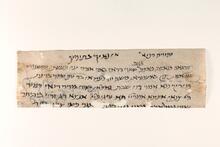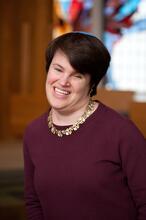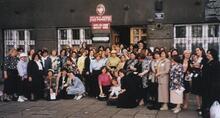Asnat Barazani
Asnat Barazani was a highly educated Torah scholar in late 16th and early 17th century Kurdistan. After her father’s death, he passed leadership of his Yeshiva in Mosul to Asnat’s husband, but she essentially ran it, taking rabbinic students under her supervision. Asnat was respected and admired for her Torah scholarship by rabbis far and wide, and she never engaged in housework as other women did. Subsequently, she was and is the subject of much pride, fascination and local folklore.
An Unorthodox Upbringing
Asnat Barazani was the daughter of the eminent Rabbi Shmuel b. Netanel Ha-Levi of Kurdistan (1560?–1625/1635?). Her father, a scholar and mystic with a large following, aimed to rectify the plight of his brethren, namely, the dearth of educated leaders. He built a yeshiva in Mosul where he hoped to train young men who would become community leaders and scholars. Since he had no sons, he trained his daughter to be a learned scholar of the highest order. She described her upbringing in a letter:
I never left the entrance to my house or went outside;
I was like a princess of Israel...
I grew up on the laps of scholars, anchored to my father of blessed memory.
I was never taught any work but sacred study, to uphold, as it is said:
“And you should recite it day and night (Joshua 1: 8)” (Mann I: 511).
Yeshiva Leadership
Asnat was married to one of her father’s finest students, Rabbi Jacob Mizrahi. She described the conditions of their marriage in the continuation of the above letter:
“And he (my father) made my partner swear never to allow me to engage in work, and thus he did as he was commanded. From the start, the Rabbi (Mizrahi) was involved in his studies and did not have time to teach the students, so I would teach them in his stead, a helpmate...” (ibid.). Thus we learn that Rabbi Mizrahi agreed to conditions whereby Asnat would never have to spend her time on housework, because she was a Torah scholar like himself. After her father died, her husband technically became the head of the Yeshiva, but in fact it was Asnat who taught the students who had come for rabbinic training.
When R. Mizrahi passed away, the leadership of the yeshiva naturally passed to his widow, and since she had already been the students’ teacher, the transition was natural and painless. Unfortunately, neither her father nor her husband had been successful fundraisers and the yeshiva was always in financial straits. Asnat wrote a number of letters requesting funds in which she described the dire situation that had befallen her and her children. Her home and belongings had been confiscated, as had their clothing and books. She was still teaching Torah, but the debts were adding up and, as a woman, she felt it was inappropriate for her to travel in search of financial support. In letters addressed to her, one can see the respect and admiration of fellow rabbis from far and near.
Myths & Legends
Few of her writings are extant, but one can perceive in them her complete mastery of Torah, Talmud, Midrash, Kabbalah and Hebrew, for her letters are lyrical as well as erudite. A recently discovered manuscript provides additional insight into her life. Inter alia, it reveals an attempt to deceive her regarding the means of delivery of contributions to her yeshiva. In addition, there are numerous stories about her, most of which have been found in amulets, which allude to her supernatural powers. These include her ability to limit her childbearing to two children so that she could devote herself to her studies, and the ability to freeze an intruder in his tracks in order to prevent him from raping her, a feat achieved by loudly calling out holy names. Ironically enough, while in life her sex did not seem to present a problem, in local folklore her sexuality clearly plays a central role. Nevertheless, she successfully ran a yeshiva which continued to produce serious scholars, including her son, whom she sent to Baghdad upon request, where he continued the dynasty of rabbinic scholars.
One well known legend claims that Asenath received messages from her father via dreams. While visiting Amedi on Rosh Hodesh, she convinced the community to celebrate outside. When the synagogue suddenly went up in flames, by means of a secret name, she alerted the angels of the danger; they successfully extinguished the fire. The synagogue whose contents were unharmed was renamed in Asenath’s honor.
Impact & Legacy
No mention of opposition to her leadership is recorded. She was clearly important to the Kurdish Jews in her lifetime, but one cannot find any influence on the lives of other women in the community, even of her daughters. However, her status has been used to justify permitting Orthodox women to be ordained as rabbis. In addition, her descendants have copies of their family tree and are proud to be related to her. Today she is still idolized by Kurdish Jews as her achievements are viewed as a sign of greatness.
Ben-Yaakob, Avraham. Kurdistan Jewish Communities (Hebrew). Jerusalem: 1981.
Benayahu, Meir. “R. Samuel Barzani: Leader of Kurdistan Jewry,” (Hebrew) Sefunot 9 (1965): 23–125.
Brauer, Erich. The Jews of Kurdistan, ed. Raphael Patai. Detroit: Wayne State University Press, 1993.
Mann, Jacob. Texts and Studies in Jewish History and Literature, Vol. I. New York: Ktav Pub. House, 1972.
Melammed, Uri and Renée Levine. “Rabbi Asnat: A Female Yeshiva Director in Kurdistan,” Pe’amim 82 (2000): 163–178.
Sabar, Yonah. The Folk Literature of the Kurdistani Jews: An Anthology. New Haven: Yale University Press, 1982.
Rivlin, Yosef Yoel. Poetry of the Aramaic-Speaking Jews (Hebrew). Jerusalem: 1959.





